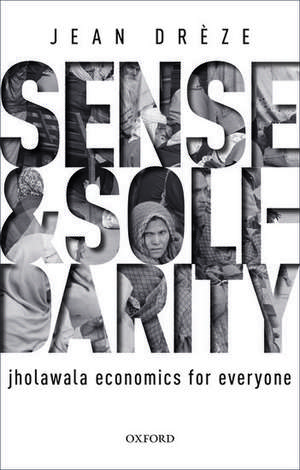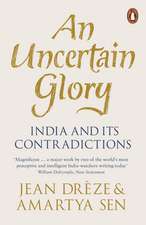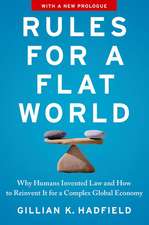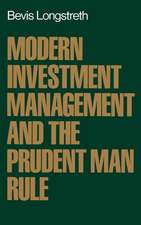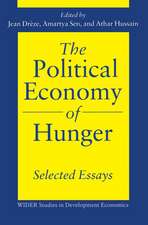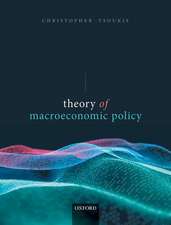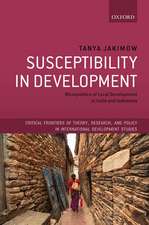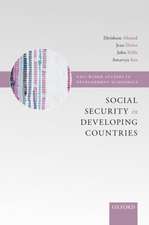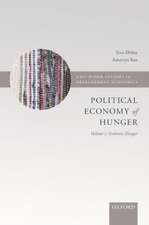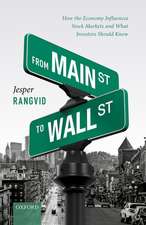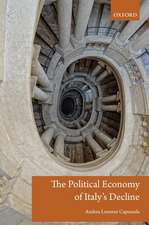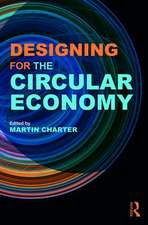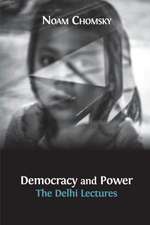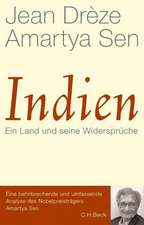Sense and Solidarity: Jholawala Economics for Everyone
Autor Jean Drèzeen Limba Engleză Hardback – 27 feb 2019
Preț: 256.48 lei
Nou
Puncte Express: 385
Preț estimativ în valută:
49.08€ • 51.24$ • 40.53£
49.08€ • 51.24$ • 40.53£
Carte disponibilă
Livrare economică 14-20 martie
Preluare comenzi: 021 569.72.76
Specificații
ISBN-13: 9780198833468
ISBN-10: 0198833466
Pagini: 358
Dimensiuni: 146 x 217 x 25 mm
Greutate: 0.57 kg
Editura: OUP OXFORD
Colecția OUP Oxford
Locul publicării:Oxford, United Kingdom
ISBN-10: 0198833466
Pagini: 358
Dimensiuni: 146 x 217 x 25 mm
Greutate: 0.57 kg
Editura: OUP OXFORD
Colecția OUP Oxford
Locul publicării:Oxford, United Kingdom
Recenzii
Jean Drèze is one of the world's finest development economists. He works in a space that is widely but incorrectly ignored by most. The practical implications of evidence-based economics cannot be worked through without engaging all of society in democratic discussion, including (especially) those who are working for change. Economics itself fails without that engagement. In this collection of beautiful essays, some previously unpublished, Drèze uses economics, philosophy, and his extensive practical experience to illuminate the whole range of social policy in India. Read on!
Anyone with any interest in the fate of democracy and development in India should buy the book at once.
It is this combination of passion and humour, of sincerity and argumentativeness, that makes Jean Drèze's book such a compelling read. You may not always agree with the happy warrior, but you have to engage with him. Besides, he is good company!
Economist Jean Drèze's new book makes an increasingly necessary argument that creating a morally good, progressive society is as important as improving traditional development indexes.
I have learned a lot from reading the articles in this book as they came out over the years and really enjoyed reading the introduction on social development, democracy, research, and action as Jean was working on it. It has some very important words of wisdom and experience for aspiring jholawala economists.
Beautifully produced, with a catchy and moving introduction this collection is a pleasure to read. Drèze writes elegantly and passionately, shorn of rhetoric, arguing that we see India from the lens of the marginalised.
This collection of Drèze's essays, originally published in the opinion pages of news publications between 2000 and 2017, offers a remarkable view of these tumultuous years.
When an objective economic history of modern India is written, jholawalas will rub shoulders with post-independence socialism of Nehru and the Fund-Bank nudged reforms of 1990s. The right-based schemes, the debates regarding universal basic income and formulation of public policy through a democratic process owe a huge intellectual debt to the jholawalas, of which Jean Drèze is a giant.
...a wonderful writer who reminds me of George Orwell... But Drèze is Orwell Plus, because he is also an economist and has been an important participant in some of the most interesting social change episodes in recent Indian history... All in all a wonderful book and an indispensable man.
Drèze writes lucidly with a lot of passion on issues that really impact India.
The book may be seen as a bridge between the more standard economics texts and the more lucid narratives of the struggles of marginalized people, such as Arundhati Roy's Broken Republic, which also deals with topics such as poverty, tribal rights. and government policy.
This book is admirable in many ways and deserves its popularity in India
The scholarly contributions of Jean Drèze over the last two decades have significantly shaped our understanding of the extent and nature of poverty and social vulnerability across India
Anyone with any interest in the fate of democracy and development in India should buy the book at once.
It is this combination of passion and humour, of sincerity and argumentativeness, that makes Jean Drèze's book such a compelling read. You may not always agree with the happy warrior, but you have to engage with him. Besides, he is good company!
Economist Jean Drèze's new book makes an increasingly necessary argument that creating a morally good, progressive society is as important as improving traditional development indexes.
I have learned a lot from reading the articles in this book as they came out over the years and really enjoyed reading the introduction on social development, democracy, research, and action as Jean was working on it. It has some very important words of wisdom and experience for aspiring jholawala economists.
Beautifully produced, with a catchy and moving introduction this collection is a pleasure to read. Drèze writes elegantly and passionately, shorn of rhetoric, arguing that we see India from the lens of the marginalised.
This collection of Drèze's essays, originally published in the opinion pages of news publications between 2000 and 2017, offers a remarkable view of these tumultuous years.
When an objective economic history of modern India is written, jholawalas will rub shoulders with post-independence socialism of Nehru and the Fund-Bank nudged reforms of 1990s. The right-based schemes, the debates regarding universal basic income and formulation of public policy through a democratic process owe a huge intellectual debt to the jholawalas, of which Jean Drèze is a giant.
...a wonderful writer who reminds me of George Orwell... But Drèze is Orwell Plus, because he is also an economist and has been an important participant in some of the most interesting social change episodes in recent Indian history... All in all a wonderful book and an indispensable man.
Drèze writes lucidly with a lot of passion on issues that really impact India.
The book may be seen as a bridge between the more standard economics texts and the more lucid narratives of the struggles of marginalized people, such as Arundhati Roy's Broken Republic, which also deals with topics such as poverty, tribal rights. and government policy.
This book is admirable in many ways and deserves its popularity in India
The scholarly contributions of Jean Drèze over the last two decades have significantly shaped our understanding of the extent and nature of poverty and social vulnerability across India
Notă biografică
Jean Drèze, development economist, has taught at the London School of Economics and the Delhi School of Economics and is currently Visiting Professor at Ranchi University. He has made wide-ranging contributions to development economics and public policy, with special reference to India. He is co-author (with Amartya Sen) of Hunger and Public Action (Oxford University Press, 1989) and An Uncertain Glory: India and Its Contradictions (Penguin, 2013).
